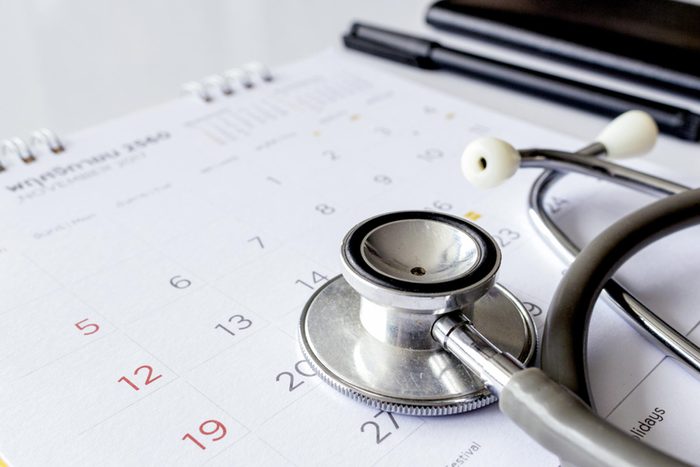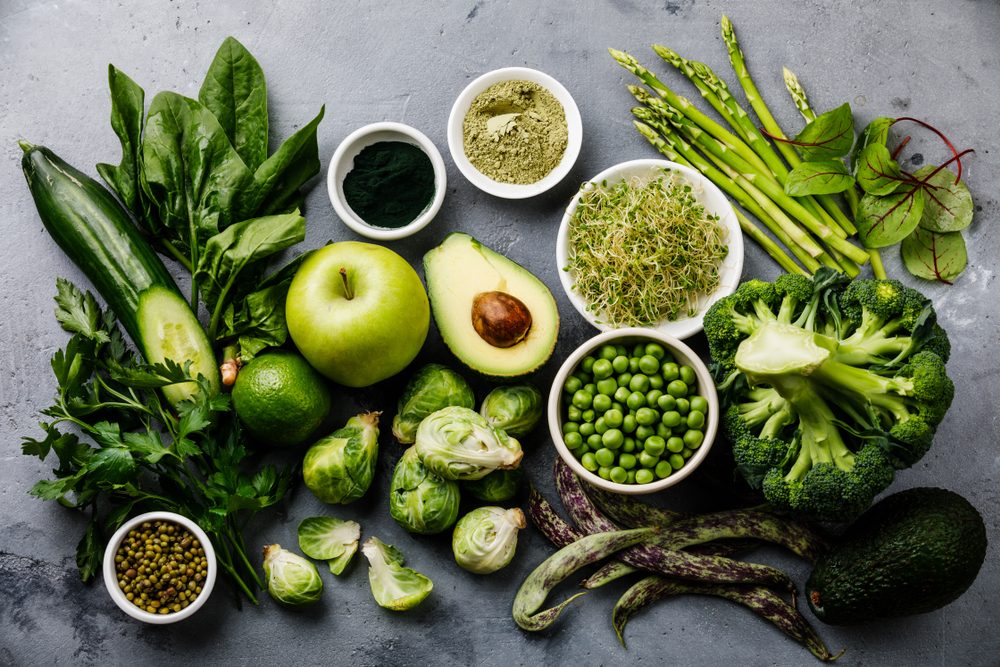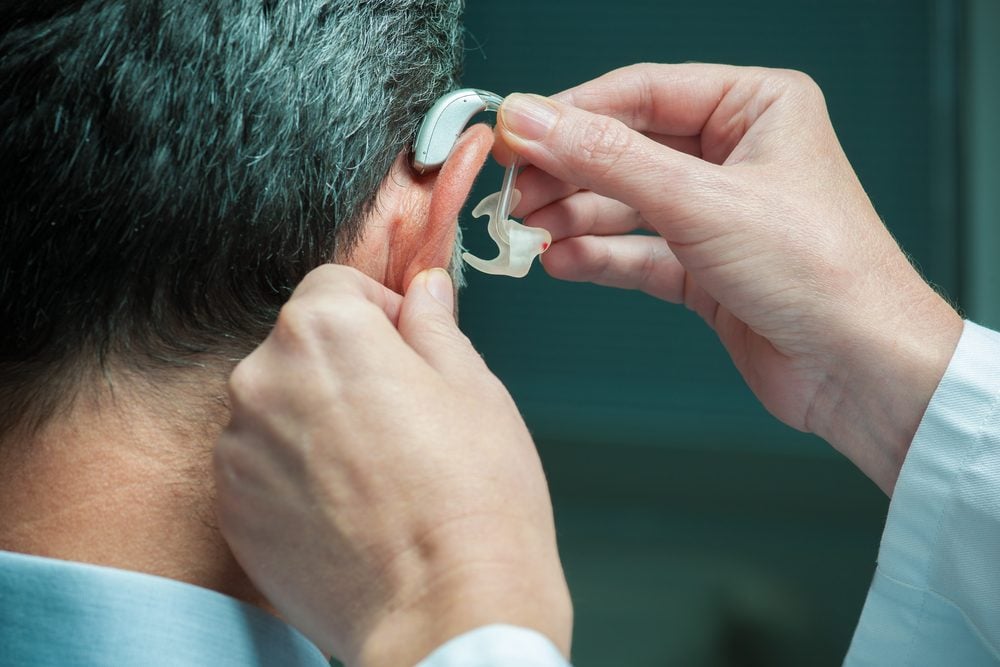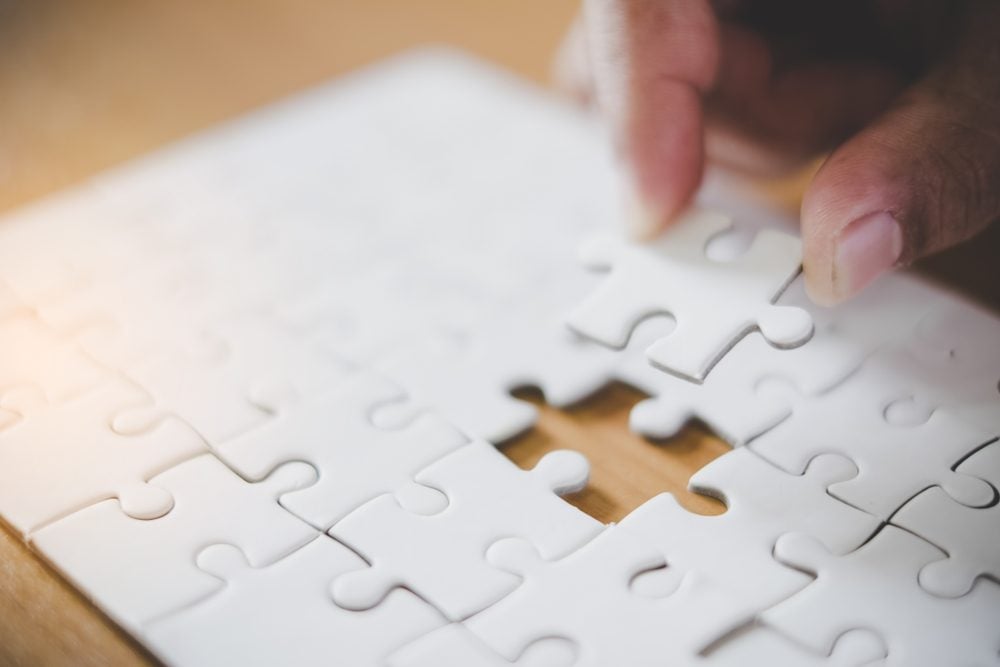You Know Youre 80 Years Old When
How do you go along your brain young?
A rich new area of science is analyzing which healthy habits all-time keep your mind and retentiveness good for you in the 40s and beyond. Kenneth S. Kosik, MD, co-managing director of the Neuroscience Research Institute at the Academy of California, Santa Barbara, has studied which habits most powerfully boost our cognitive function. Here, he shares the near up-to-date research from innovative labs plus the best brain-boosting tips from his book Outsmarting Alzheimer's. These are daily habits of people with impressive retentivity.

Play games with your frontal lobe
Whether you're deliberating a chess move or bluffing at cards, you're also giving the frontal lobe, the area of your brain that handles executive function, a workout. "The frontal lobe is particularly vulnerable to degeneration and the effects of aging," says Dr. Kosik. A report published in 2015 in Brain Imaging Behavior found that adults in middle historic period who routinely worked on puzzles and played board games had higher brain book in the area responsible for cognitive functions, including memory, than those who didn't play games. These weird encephalon exercises can assistance y'all get smarter.

Stay young with saa, taa, naa, and maa
Dharma Singh Khalsa, Doc, president and medical director of the Alzheimer'due south Enquiry and Prevention Foundation and author of Brain Longevity, has spent many years studying the meditative tradition chosen Kirtan Kriya and has constitute that daily 12-minute sessions of the practice tin can improve blood flow to the brain and possibly even increase levels of telomerase, an enzyme that slows cell aging. The practice is uncomplicated: While breathing deeply, dirge the Sanskrit words saa, taa, naa, maa (which mean "my divine cocky") while moving your pollex to touch your alphabetize, middle, ring, and little finger fingers with each new sound. Like any meditation, information technology may aid to lift anxiety and fatigue. Here are other compelling health benefits of meditation.

Protect your heed from your heart
Scientists surveyed volunteers about seven familiar centre-wellness factors and tested their cerebral performance at two points over eight years. The results, published in 2017 in the journal Stroke, found that the more than middle-good for you habits people had, the less cognitive reject they showed. A stronger cardiovascular system means a stronger pipeline of nutrients to the brain, says pb writer Hannah Gardener, ScD, an epidemiologist and assistant scientist in the Department of Neurology at the University of Miami. The seven heart-health ethics to strive for: Not smoking; maintaining a salubrious BMI (body mass alphabetize); staying physically active (aim for at least 150 minutes per calendar week); having healthy total cholesterol (nether 200 mg/dL), blood pressure (under 120/lxxx mmHg), and blood carbohydrate (nether 100 mg/dL); and post-obit an eating plan that'south rich in fruits, veggies, and whole grains, and depression in sodium and sweets. They all may be familiar, if a little overwhelming, but "each one helps," says Gardener. Check out these advances in middle health.

Elevator the quality of your white matter
As the brain ages, its white thing oft develops small lesions because of disrupted blood flow, leading to impaired cognitive function and mobility. A report published in 2019 in the Journal of Applied Physiology suggests that force grooming may help lessen cerebral refuse. When study participants lifted weights, they got stronger, of course, but they also changed the cellular environment inside their brains, improving their power to recollect. Key moves you tin endeavor at home (using soup cans for weight): biceps curls, triceps extensions, dogie raises, mini squats, mini lunges, and lunge walks. Aim for 45 minutes a session. Here are some more brain facts that volition blow your mind.

Brand moves directly confronting Alzheimer's
Exercise benefits the brain by improving vascular health—but a study published in 2014 in Inflammation and Cell Signaling suggests it also combats the chronic neuroinflammation seen in Alzheimer'southward, depression, and other brain diseases. In such neurological conditions, the inflammation that normally clears tissue damage doesn't shut off and starts to interfere with communication between neurons. Exercise has proven anti-inflammatory effects against diseases like diabetes and rheumatoid arthritis, and then that could exist why practice protects encephalon health also, says banana professor Jonathan Little, PhD, associate professor in the School of Health and Practice Sciences at The University of British Columbia. "Any blazon of moderate-intensity exercise, such equally walking, cycling, and swimming, tin can accept anti-inflammatory effects," says Dr. Little. Aim for most 30 minutes a solar day.

Get your blood pumping
Although whatsoever exercise is good, aerobic workouts may be the all-time for brain health. A study published in 2018 in the Journal of the American Geriatrics Lodge found that older adults at risk for or who already have Alzheimer's, aerobic practice may be more than effective than other types of exercise in preserving the ability to recollect and brand decisions. "Research shows that aerobic exercise increases claret flow in the hippocampus, the memory region of the brain," says neuroscientist Sandra Bail Chapman, PhD, founder and chief director of the Heart for BrainHealth at the University of Texas at Dallas. "This is likewise the area well-nigh affected by Alzheimer's, so you are strengthening a vulnerable part of the brain." Check out more ways exercise makes your brain improve.

Think deep thoughts
The brain relies on connections between neurons to role well, reports the National Found on Aging. In Alzheimer's, these connections begin to die off. Doing all yous can at present to assistance strengthen your neural connections will aid protect your brain as you historic period. Use any opportunity in your daily routine for critical idea and analysis. "The strongest mental addiction is to pursue deeper level thinking," Dr. Chapman says. "This can happen in your everyday life, for instance abstracting themes from shows you see or books you lot read. Deeper-level thinking is like push-ups and sit down-ups for the encephalon." Joining a volume club or even discussing your favorite episode of a Television set show with your partner is an excellent identify to start. This is why reading is and then important for your brain.

Keep your heed working
Another mode to keep those neurons potent is to encourage neuroplasticity, which is the brain's ability to rewire itself and form new connections. Research, including a study published in 2015 in Neuroscience, shows that cognitive stimulation actually helps better brain plasticity. Whatever new tasks you effort can help keep your brain active, motivated, and inspired. "The brain is quickly jaded on routine and goes to car-pilot when it gets bored," Dr. Chapman says. "Doing new things—and improving things yous're already doing—can aid your brain gain ground." Hither are more things to do to keep your brain sharp and healthy later in life.

Get brain circuits singing
Listening to or playing music can activate the motor cortex (touching a pianoforte key or guitar cord), the auditory cortex (hearing the notes yous make), and the emotional middle, or limbic system (feeling moved by a beautiful passage). "Circuits and networks are stimulated by these activities, which aid keep the brain salubrious," says Dr. Kosik. Hither are ten wondrous things that happen to your torso when y'all listen to classical music.

MIND your eating habits
A study published in 2015 in the periodical Alzheimer's & Dementia found that combining elements of the Mediterranean diet and the centre-good for you DASH (Dietary Approaches to Cease Hypertension) diet is good for your encephalon. Following the MIND diet (short, for Mediterranean-Dash Intervention for Neurodegenerative Delay) was found to reduce the adventure of Alzheimer's up to fifty per centum. "The nutrient you swallow provides the fuel for your brain, and the Listen nutrition produces the best kind of fuel," Dr. Chapman says. "It includes such things equally whole grains, leafy green vegetables, basics, fish, berries, olive oil, beans, every bit well as limited amounts of cheese, wine, and dark chocolate." Hither are more of the all-time foods to eat to boost your encephalon health.

Skip the fat
There has been debate over the part of dietary fat in Alzheimer's. According to Dr. Chapman, "Fried foods and foods loftier in saturated fatty should be avoided." We already know these foods aren't good for your health in general, so that'south some other good reason to requite them a pass. A loftier-fat nutrition can too cause weight gain, which is a chance cistron for diabetes—and diabetes, in turn, is a risk factor for Alzheimer'due south. Although scientists aren't sure exactly how diabetes and Alzheimer's are linked, the Alzheimer'south Association suggests diabetes damages blood vessels in the brain, alters encephalon chemistry, and contributes to inflammation that harms brain cells. These are the foods that are secretly hurting your encephalon.

Take a probiotic
Scientists are just get-go to sympathize how the collection of good leaner in your GI tract, known equally the gut microbiome, influences your brain. "Feedback signals from the gut tell the encephalon about gastric and intestinal motion, gut hormone secretion, and gut inflammation," says Linda Rinaman, PhD, a professor of psychology and neuroscience at Florida State Academy who's studied the gut-brain connectedness. Much of the enquiry on the "gut-brain axis" in relation to the development of Alzheimer's has been observed in rodents. Just new studies in humans, including one published in 2017 in Scientific Reports, are also revealing a connection between the type of bacteria in the gut and the likelihood of Alzheimer's. Although probiotics, which aim to balance your gut bacteria, haven't yet been proven to protect brain health, information technology may be worth giving them a try—or eating probiotic-rich foods similar yogurt or sauerkraut.

Get your Zzz's on
You know what a bad night's sleep tin do to your focus the side by side day. Over the years, regular sleep deprivation can raise your risk of dementia, suggests a written report published in 2018 in Proceedings of the National Academy of Sciences. "During sleep, your brain literally cleans out some of the toxicity that has built up from stress or agitation," Dr. Chapman says. "Without good sleep, we come across increased anxiety and stress. Sleep is restorative, helping you lot be more mentally energetic and productive. Even a quick nap helps." Merely go on daytime snoozing to about an hr, every bit longer than an 60 minutes and a one-half may be detrimental to your noggin, according to a study published in 2016 in the Journal of the American Geriatrics Club. Here's another scary thing that happens to your brain when you don't get enough sleep.

Accentuate the positive
Doctors have long known in that location's a connection between depression and Alzheimer's. Now, inquiry, including a written report published in 2015 in the Journal of Alzheimer'south Illness, suggests that low is actually a risk cistron for the disease. In improver, stress and stress hormones in the encephalon take as well been linked with dementia. On the other hand, a study published in 2018 in PLOS One found that a positive attitude about aging is actually associated with a lesser chance of developing dementia, even in the presence of other risk factors. If y'all're depressed, it's best to become aid at present. "Positivity always helps, but information technology'southward only equally important to embrace mistakes to learn from them and non be stuck," Dr. Chapman says. Make sure you lot're aware of the 9 medical reasons your brusk-term memory is getting worse.

Make new friends, and keep old ones
Socializing and maintaining friendships can protect against cognitive reject. "One of the most powerful things for encephalon health is relating to others—a shared sense of community is ane of the elevation 3 factors associated with brain health as we age," Dr. Chapman says. "Socialization also requires some of the nigh complex cognition because information technology requires us to constantly negotiate an agreement with those effectually us. For the brain, information technology's like constantly solving a puzzle." Go along in mind: It's not the number of friends you have, she says, merely rather the quality and depth of your connections. Here are 10 facts that prove friends are ridiculously salubrious for usa.

Don't multitask
Trying to focus on several things at one time puts a strain on the brain and information technology negatively impacts memory, especially every bit we age, co-ordinate to inquiry, including a study published in 2014 in PLOS One."Multitasking is as toxic to the brain as cigarette smoking is to the lungs, but the effects become apparent much more quickly," Dr. Chapman says. "Multitasking, which is really the brain constantly switching betwixt tasks, decreases memory function and reduces hippocampal size. Information technology fatigues the system and breaks down your immune system." All of these things combined make avoiding multitasking the number one thing people should exercise to maintain and heighten their encephalon health, she says. Hither are viii reasons why you lot might be suffering brain fog.

Skip sugar
Research has found a high-carb diet loaded with added sugars can dirty your thinking and your retention. Y'all don't accept to have diabetes to take the kind of high blood saccharide levels that can speed your brain's cerebral reject, suggests several studies, including one published in 2018 in Diabetologia. "Although the brain relies on sugar for its master source of energy, too much sugar flooding into the encephalon at once from a loftier-sugar diet can overload the brain and cause negative effects such as lapses in concentration, learning, and even advanced aging of the cells," says Erin Palinski-Wade, RD, CDCES, a registered dietitian, certified diabetes care and teaching specialist, and author of 2 Twenty-four hour period Diabetes Diet. "By eating a diet low in added sugars, you can help to forestall spikes in blood glucose levels that may cause these damaging effects while making sure the brain still gets the energy it needs to function at its peak." Here'southward how to train your brain to hate junk nutrient.

Limit alcohol
A study published in 2018 inThe Lancet suggests that having more than 3 drinks a day for women or 4 for men substantially raises the risk for dementia, and particularly early-onset dementia. "Drinking excessive amounts of booze can have a negative affect on the brain—another report (published in 2014 in Neurology) found excessive drinking may accelerate memory loss as we historic period," Palinski-Wade says. The jury is still out on moderate drinking: Although a study published in 2017 in BMJ suggests information technology may be detrimental for your brain, the harm might be balanced past its heart benefits. If you do drinkable booze, stick to the recommended one potable a day for women, two for men. Lookout man for the signs your brain is crumbling faster than you are.

Load up on fruits and veggies
You can become antioxidant compounds called flavonoids in most brightly colored fruits and vegetables—and they can help keep your brain healthy. "Antioxidants fight against damage to cells acquired by free radicals," says Palinski-Wade. "When free radicals are present, they can impairment cells, including encephalon cells, causing premature crumbling and raising your risk of disease. A high level of antioxidants in your diet can assistance fight against free radical harm and offer protective benefits to cells." A daily dose of this ane veggie can boost your brain, science says.

Spice it up
Curcumin, present in the back-scratch spice turmeric, may take some antioxidant properties besides. A written report published in 2014 in Applied Physiology, Nutrition, and Metabolism found that the compound curcumin in turmeric can increment encephalon levels of brain-derived neurotrophic factor (BDNF), a growth hormone. "Since diseases such as low and Alzheimer's affliction have been linked to failing levels of BDNF, experts theorize that increasing levels this hormone may fight against these diseases of the brain," Palinski-Wade says. Read almost more than encephalon-boosting foods that will keep you sharp.

Drink java
Researchers have found that java appears to be a boon to encephalon health, according to a study published in 2014 in The Periodical of Diet. "The brain benefits from coffee come mainly from caffeine, which stimulates the central nervous system," says Palinski-Wade. "In moderate amounts, caffeine tin can enhance focus and concentration. Caffeine may too boost short-term retention." Plus, antioxidants in java may help protect brain cells, she says. Simply don't overdo the java: "Excessive levels of caffeine tin can suppress the release of serotonin in the brain" over fourth dimension, which messes with slumber, another of import part of brain health, warns Palinski-Wade. "Aim to continue your overall caffeine intake to less than 400 mg [nearly 4 cups] per day," Palinski-Wade says.

Protect your noggin from bumps
Wearing a helmet when bike riding isn't just to save your life—it'south really important for your long-term brain wellness equally well. The Alzheimer's Association notes that caput trauma is strongly linked with Alzheimer's take chances, and the before in life the injury occurs, the greater the chance of dementia afterward. Wear a helmet when playing sports, a seat belt when driving, and take measures to prevent falls in your home such as installing non-skid carpets, railings on stairs, and keeping clutter and wires out of trafficked areas. Here are more than surprising things almost your encephalon we bet yous didn't know.

Protect your hearing
One in iii people between ages 65 and 74 have hearing loss; nearly one-half of people 75 and older do. This can take a negative bear on on your brain: A report published in 2019 in Auris, Nasus, Larynx suggests a link between hearing loss and cognitive turn down. Doctors don't know exactly why, but it could have something to do with hearing keeping your brain active; social isolation (a risk factor for Alzheimer's) caused by hearing loss could also exist a factor. Merely the skillful news is that those who are treated for hearing loss, such as with hearing aids, may be able to improve their cognitive abilities, as a written report published in 2018 in The Journals of Gerontology constitute. Observe out more means your encephalon changes as y'all become older.

Use headphones
While the idea that cellphone related emissions could harm your encephalon seems highly unlikely, information technology may be decades earlier we learn the true touch on of radiofrequency free energy on the mind, says the National Cancer Constitute. Experts suggest staying on the rubber side past using speakerphones or headphones. In 2017, the California department of health issued guidelines alarm people to avert putting phones next to their heads. But proceed the volume down to help protect your hearing. Find out more ordinary things y'all don't realize are messing with your brain.

Go dancing
You've heard that practise is good for your brain; y'all may too know that music is skillful for your brain. Then there's the fact that socializing continue your mind healthy. Put them all together and what do you get? Dancing! A landmark written report in the New England Journal of Medicine found dancing to exist one of the top leisure activities that can help reduce the risk of dementia. Contempo research published in 2017 in Frontiers in Human Neuroscience backs this upward: Regular dancers had fewer signs of aging in the brain. Dancing tin can also better mood, which benefits the mind; learning and memorizing trip the light fantastic routines as well present a salubrious challenge to your thinking process. Read about more of the best brain-boosting activities with science on their side.

Become bilingual
A number of big-scale studies take reported no definitive connectedness betwixt knowing a second language and a afterward onset of Alzheimer's and dementia. Even so. a study published in 2014 in Register of Neurology suggests that speaking a second linguistic communication may protect confronting dementia.

Try out CBT
A study published in 2017 in Behavioural Brain Enquiry suggests that a type of talk therapy called cognitive behavioral therapy (CBT) may help prevent Alzheimer's. How then? CBT tin ease depression and better sleep—two take a chance factors for dementia. With CBT, you learn how to redirect your brain abroad from negative or distracting thoughts. Here are 9 foods that are secretly hurting your brain.

Get a pet
In the same vein of "what's good for your eye is good for your brain," dogs can help heal your mind. Having a canine companion tin can reduce cardiovascular risk, suggests a study published in 2017 in Scientific Reports. Why? Probably because that domestic dog is going to need walks. "I walk my dogs two times a twenty-four hours for a total of 2 to three miles," says Aaron Ritter, MD, a neuropsychiatrist at the Cleveland Clinic Lou Ruvo Center for Brain Wellness in Las Vegas. "Having eager and dependent exercise partners ensures that I cannot skip days.The exercise and meaningful companionship aid keep me happy and healthy."

Go exterior
Here's another way Fido can help your brain—by getting you outdoors. A written report published in 2015 in Landscape and Urban Planning shows that being in nature has a positive consequence on cerebral function. Anyone who's ever felt the need to "clear their caput" tin can adjure to the power of the outdoors in recharging thinking. Read more on how nature is your brain's miracle medicine.

Laugh more
Laughter really is the best medicine when it comes to your encephalon health. The act of laughing lowers stress hormones while boosting your mood. In a study of older adults, published in 2014 inAdvances in Mind-Body Medicine, viewing a funny video boosted scores on memory tests while lowering levels of stress hormones. Here are more retentivity-boosting tips from brain scientists.

Go online
Using a computer was even more constructive than crafting in reducing the risk of dementia risk, co-ordinate to the 2017JAMA Neurology study. Although the authors couldn't say exactly why, they theorize that computers "require specific technical and transmission skills and that these could exist the factors that might exist associated with a decreased risk of cerebral reject." Hither are 15 ways technology tin can make you sick.

Call up quality, not quantity, of info
Be wary of information overload on the net: Trying to comprehend it all is merely like multitasking—the brain can't figure out what'southward important. A study published in 2019 in World Psychiatry constitute that high-levels of internet apply has a negative impact on the encephalon. The never-ending stream of prompts and notifications encourages us to constantly divide our attention. Then, in plow, may reduce our capacity for maintaining concentration on a single task. Read more well-nigh the one surprising cyberspace habit that could put your brain at run a risk of dementia.

I proficient habit is non enough
Mayhap the best advice for brain health is that yous can't latch onto one matter and look it to protect yous from cerebral turn down. A study published in 2015 in The Lancet suggests that a comprehensive program giving patients guidance on everything from diet and exercise to brain training and the management of metabolic risk factors could ameliorate prevent cognitive decline. Compared to people in the command group (who lived life as they normally would), the intervention group scored 83 per centum higher on tests of critical thinking, and they could problem solve 150 percent faster. Check out the x ways your brain changes as you lot get older.

Continue your trunk salubrious to save your listen
A healthy lifestyle will protect your brain, so get regular checkups and treat any issues. For case, yous may need to take medicine for claret force per unit area or cholesterol, get help for slumber apnea, or keep diabetes well managed. Research published in 2016 in Annals of the New York Academy of Sciences shows how personalized prevention plans can help with your current medical issues and your hereafter brain health. Bottom line: In that location is no 1-size-fits-all approach. Discover more than things you never knew about your brain.
Adapted from the book Outsmarting Alzheimer'due south past Kenneth Southward. Kosik, Physician.
Sources
- Kenneth South. Kosik , Physician, co-director of the Neuroscience Research Institute at the Academy of California, Santa Barbara and writer of Outsmarting Alzheimer's
- Brain Imaging Behavior : " Participation in cognitively-stimulating activities is associated with brain structure and cerebral role in preclinical Alzheimer'southward disease"
- Dharma Singh Khalsa , Doc, president and medical managing director of the Alzheimer's Research and Prevention Foundation and author of Brain Longevity
- Stroke: " Ultrasound Markers of Carotid Atherosclerosis and Cognition: The Northern Manhattan Study"
- Hannah Gardener , ScD, an epidemiologist and assistant scientist in the Department of Neurology at the University of Miami
- Journal of Applied Physiology: ," Resistance-do preparation ameliorates LPS-induced cerebral harm concurrent with molecular signaling changes in the rat dentate gyrus"
- Inflammation and Cell Signaling: "Adiponectin and Alzheimer's illness: Is there a link?"
- Jonathan Petty, PhD, acquaintance professor in the Schoolhouse of Health and Exercise Sciences at The University of British Columbia
- Journal of the American Geriatrics Society: " Tin Practice Meliorate Cognitive Symptoms of Alzheimer's Disease?"
- Sandra Bond Chapman , PhD, founder and chief managing director of the Middle for BrainHealth at the University of Texas at Dallas
- National Establish on Crumbling: "What Happens to the Brain in Alzheimer'southward Disease?"
- Neuroscience: " Hippocampal plasticity during the progression of Alzheimer'southward affliction"
- Neuropsychology, development and cognition : " An Arts Intervention for Older Adults Living in Subsidized Retirement Homes"
- Experimental Aging Inquiry : "Extending the Reach of an Evidence-Based Theatrical Intervention"
- Neurology: " Risk and protective factors for cognitive impairment in persons aged 85 years and older"
- Alzheimer's & Dementia : Mind Nutrition Associated with Reduced Incidence of Alzheimer's Illness
- Alzheimer's Association: "Alzheimer's Illness and Type two Diabetes"
- Linda Rinaman , PhD, professor of psychology and neuroscience at Florida State University
- Scientific Reports: " Gut microbiome alterations in Alzheimer's disease"
- Proceedings of the National Academy of Sciences: "β-Amyloid accumulation in the man brain later one night of sleep deprivation"
- Periodical of the American Elderliness Society: , " Afternoon Napping and Cognition in Chinese Older Adults: Findings from the China Health and Retirement Longitudinal Report Baseline Assessment"
- Journal of Alzheimer's Affliction: "Brain structure and function related to depression in Alzheimer's affliction: contributions from neuroimaging research."
- PLOS Ane: "Positive age beliefs protect confronting dementia even among elders with loftier-risk gene"
- PLOS One: " Higher Media Multi-Tasking Activeness Is Associated with Smaller Gray-Matter Density in the Anterior Cingulate Cortex"
- Diabetologia: "HbA 1c , diabetes and cognitive reject: the English language Longitudinal Study of Ageing"
- Erin Palinski-Wade , RD, CDCES, a registered dietitian, certified diabetes care and education specialist, and author of ii Day Diabetes Diet
- The Lancet: " Contribution of booze utilise disorders to the burden of dementia in France 2008–13: a nationwide retrospective cohort report"
- Neurology: " Alcohol consumption and cognitive decline in early old historic period"
- BMJ: " Moderate booze consumption as hazard gene for adverse brain outcomes and cognitive decline: longitudinal cohort written report"
- Journal of Nutritional Science : "Flavonoids: an overview"
- Practical Physiology, Nutrition, and Metabolism: " Effects of curcumin on brain-derived neurotrophic gene levels and oxidative damage in obesity and diabetes."
- The Journal of Nutrition: " Caffeine and Alcohol Intakes and Overall Nutrient Capability Are Associated with Longitudinal Cerebral Performance among U.South. Adults"
- The Alzheimer's Clan: "Prevention"
- National Found on Aging: "Hearing Loss: A Common Problem for Older Adults"
- Auris, Nasus, Larynx: "Historic period-related hearing loss and cerebral decline - The potential mechanisms linking the two."
- The Journals of Gerontology: " Death, Depression, Inability, and Dementia Associated With Self-reported Hearing Problems: A 25-Year Written report"
- National Cancer Institute: "Cell Phones and Cancer Risk"
- California Department of Public Wellness : "How to Reduce Exposure to Radiofrequency Energy from Cell Phones"
- The New England Journal of Medicine : "Leisure Activities and the Hazard of Dementia in the Elderly"
- Frontiers in Human Neuroscience : "Dancing or Fettle Sport? The Effects of Two Training Programs on Hippocampal Plasticity and Balance Abilities in Salubrious Seniors"
- Harvard Medical School : "Dancing and the Brain"
- Annals of Neurology: " Does bilingualism influence cognitive aging?"
- The BMJ: " Modifiable pathways in Alzheimer's disease: Mendelian randomisation analysis"
- Nature: " How the evidence stacks up for preventing Alzheimer's disease"
- Behavioural Brain Enquiry: " Cognitive behavioral therapy (CBT) for preventing Alzheimer's disease."
- Scientific Reports: " Domestic dog ownership and the risk of cardiovascular disease and death – a nationwide accomplice report"
- Aaron Ritter, Medico , a neuropsychiatrist at the Cleveland Clinic Lou Ruvo Center for Encephalon Health in Las Vegas, Nevada
- Landscape and Urban Planning: "The benefits of nature experience: Improved impact and cognition"
- Advances in Heed-Body Medicine: " The event of humour on short-term memory in older adults: a new component for whole-person health."
- Psychological Scientific discipline: " The Impact of Sustained Date on Cognitive Function in Older Adults: The Synapse Project"
- JAMA Neurology: " Association Between Mentally Stimulating Activities in Late Life and the Issue of Incident Mild Cognitive Impairment, With an Analysis of the APOE ε4 Genotype"
- World Psychiatry: "The "online encephalon": how the Internet may be irresolute our cognition"
- The Lancet: " A 2 year multidomain intervention of nutrition, exercise, cognitive training, and vascular risk monitoring versus command to preclude cognitive decline in at-run a risk elderly people (FINGER): a randomised controlled trial."
- Annals of the New York Academy of Sciences: " Nutritional interventions for Alzheimer'due south prevention: a clinical precision medicine approach"
![]() Medically reviewed by
Medically reviewed by
Originally Published: October 17, 2018
Source: https://www.thehealthy.com/aging/mind-memory/genius-brain-habits/
0 Response to "You Know Youre 80 Years Old When"
Enregistrer un commentaire